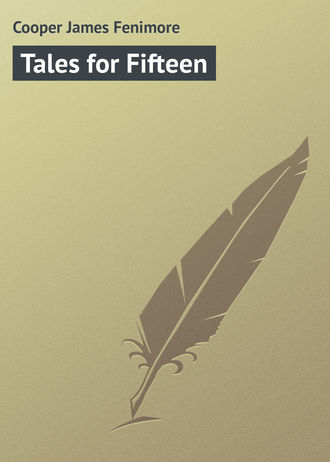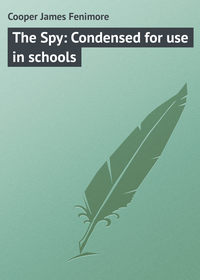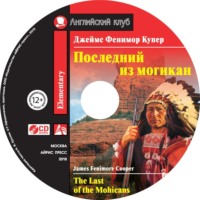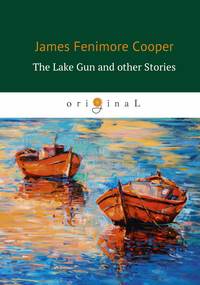 полная версия
полная версияTales for Fifteen
The following morning Miss Emmerson and her niece, attended by Charles, took a walk to examine the beauties of Albany. It did not strike our heroine as being so picturesque as it had her friend; still it had novelty, and that lent it many charms it might have wanted on a more intimate acquaintance. Their forenoon, however, exhausted the beauties of this charming town, and they had returned to the inn, and the ladies were sitting in rather a listless state when Charles entered the room with a look of pleasure, and cried "he is here."
"Who!" exclaimed Julia, starting, and trembling like an aspen.
"He! – Tony," said Charles, in reply.
Julia was unable to say any more; but her aunt, without noticing her agitation, asked mildly,
"And who is Tony?"
"Why Anthony, the driver – he is here and wishes to see you."
"Show him up, Charles, and let us learn when he will be ready to go on."
This was an awful moment to Julia – she was on the eve of being confronted, in a room, for the first time, with the man on whom she felt that her happiness or misery must depend. Although she knew the vast importance to her of good looks at such a moment, she looked unusually ill – she was pale from apprehension, and awkward and ungraceful from her agitation. She would have given the world to have got out of the room, but this was impossible – there was but one door, and through that he must come. She had just concluded that it was better to remain in her chair than incur the risk of fainting in the passage, when he entered, preceded by Charles. His upper, and part of his lower lip, were clean shaved; a small part of one cheek and his nose were to be seen; all the rest of his face was covered with hair, or hid under the patch. An enormous coloured handkerchief was tied, in a particular manner, round his neck; and his coat, made of plain materials, and somewhat tarnished with service, was buttoned as close to his throat as the handkerchief would allow. In short, his whole attire was that of a common driver of a hack carriage; and no one who had not previously received an intimation that his character was different from his appearance, would at all have suspected the deception.
"Your name is Anthony?" said Miss Emmerson, as he bowed to her with due deference.
"Yes, ma'am, Anthony – Tony Sandford," was the reply – it was uttered in a vulgar nasal tone, that Julia instantly perceived was counterfeited: but Miss Emmerson, with perfect innocency, proceeded in her inquiries.
"Are your horses gentle and good, Tony?" adopting the familiar nomenclature that seemed most to his fancy.
"As gentle as e'er a lady in the land," said Tony, turning his large black eye round the room, and letting it dwell a moment on the beautiful face of Julia – her heart throbbed with tumultuous emotion at the first sound of his voice, and she was highly amused at the ingenuity he had displayed, in paying a characteristic compliment to her gentleness, in this clandestine manner – if he preserves his incognito so ingeniously he will never be detected, thought Julia, and all will be well.
"And the carriage," continued Miss Emmerson, "is it fit to carry us?"
"I can't say how fit it may be to carry sich ladies as you be, but it is as good a carriage as runs out of York."
Here was another delicate compliment, thought Julia, and so artfully concealed under brutal indifference that it nearly deceived even herself.
"When will you be ready to start?" asked Miss Emmerson.
"This moment," was the prompt reply – "we can easily reach Schenectady by sundown."
Here Julia saw the decision and promptitude of a soldier used to marches and movements, besides an eager desire to remove her from the bustle of a large town and thoroughfare, to a retirement where she would be more particularly under his protection. Miss Emmerson, on the other hand, saw nothing but the anxiety of a careful hireling, willing to promote the interest of his master, who was to be paid for his conveyance by the job – so differently do sixty and sixteen judge the same actions! At all events, the offer was accepted, and the man ordered to secure the baggage, and prepare for their immediate departure.
"Why don't you help Antonio on with the baggage, Charles?" said Julia, as she stood looking at the driver tottering under the weight of the trunks. Charles stared a moment with surprise – the name created no astonishment, but the request did. Julia had a habit of softening names, that were rather harsh in themselves, to which he was accustomed. Peter she called Pierre; Robert was Rubert; and her aunt's black footman Timothy, she had designated as Timotheus: but it was not usual for ladies to request gentlemen to perform menial offices – until, recollecting that Julia had expressed unusual solicitude concerning a dressing-box that contained Anna's letters, he at once supposed it was to that she wished him to attend. Charles left the room, and superintended the whole arrangements, when once enlisted. Julia now felt that every doubt of the identity of her lover with this coachman was removed. He had ingeniously adopted the name of Anthony, as resembling in sound the one she herself had given him in her letters. This he undoubtedly had learnt from Anna – and then Sandford was very much like Stanley – his patch, his dress, his air – every thing about him united to confirm her impressions; and Julia, at the same time she resolved to conduct herself towards him in their journey with a proper feminine reserve, thought she could do no less to a man who submitted to so much to serve her, than to suffer him to perceive that she was not entirely insensible to the obligation.
Our heroine could not but admire the knowing manner with which Antonio took his seat on the carriage, and the dexterity he discovered in the management of his horses – this was infallible evidence of his acquaintance with the animal, and a sure sign that he was the master of many, and had long been accustomed to their service. Perhaps, thought Julia, he has been an officer of cavalry.
In the constant excitement produced by her situation, Julia could not enter into all the feelings described by her friend, during the ride to Schenectady. Its beauties might be melancholy, but could she be melancholy, and Antonio so near? The pines might be silvery and lofty, but the proud stature of majestic man, eclipsed in her eyes all their beauties. Not so Charles. He early began to lavish his abuse on the sterile grounds they passed, and gave any thing but encomiums on the smoothness of the road they were travelling. In the latter particular, even the quiet spirit of Miss Emmerson joined him, and Julia herself was occasionally made sensible that she was not reposing "on a bed of roses."
"Do I drive too fast for the ladies?" asked Antonio, on hearing a slight complaint and a faint scream in the soft voice of Julia. Oh, how considerate he is! thought our heroine – how tender! – without his care I certainly should have been killed in this rude place. It was expected that as she had complained, she would answer; and after a moment employed in rallying her senses for the undertaking, she replied in a voice of breathing melody —
"Oh! no, Antonio, you are very considerate."
For a world Julia could not have said more; and Miss Emmerson thought that she had said quite as much as the occasion required; but Miss Emmerson, it will be remembered, supposed their driver to be Anthony Sandford. The hero, himself, on hearing such a gentle voice so softly replying to his question, could not refrain from turning his face into the carriage, and Julia felt her own eyes lower before his earnest gaze, while her cheeks burned with the blushes that suffused them. But the look spoke volumes – he understands my "Antonio," thought Julia, and perceives that, to me, he is no longer unknown. That expressive glance has opened between us a communication that will cease but with our lives. Julia now enjoyed, for the remainder of their journey to Mr. Miller's, one of the greatest pleasures of love – unsuspected by others, she could hold communion with him who had her heart, by the eyes, and a thousand tender and nameless little offices which give interest to affection, and zest to passion.
They had now got half way between the two cities, and Charles took a seat by the side of the driver, with the intention, as he expressed himself, of stretching his legs: the carriage was open and light, so that all of the figures of the two young men could be seen by the ladies, as well as their conversation heard. Charles never appeared to less advantage in his person, thought Julia, than now, seated by the side of the manly and noble Antonio. The figure of Charles was light, and by no means without grace; yet it did not strike the fancy of our heroine as so fit to shield and support her through life, as the more robust person of his companion. Julia herself was, in form, the counterpart of her mind – she was light, airy, and beautifully softened in all her outlines. It was impossible to mistake her for any thing but a lady, and one of the gentlest passions and sentiments. She felt her own weakness, and would repose it on the manly strength of Antonio.
"Which do you call the best of your horses?" asked Charles, so soon as he had got himself comfortably seated.
"The off – but both are true as steel," was the laconic reply. The comparison was new to Julia, and it evidently denoted a mind accustomed to the contemplation of arms.
"How long have you followed the business of a driver, Tony?" said Charles, in the careless manner of a gentleman when he wishes to introduce familiarity with an inferior, by seeming to take an interest in the other's affairs. Julia felt indignant at the freedom of his manner, and particularly at the epithet of "Tony" – yet her lover did not in the least regard either – or rather his manner exhibited no symptoms of displeasure – he has made up his mind, thought Julia, to support his disguise, and it is best for us both that he should.
"Ever since I was sixteen I have been used to horses," was the reply of Antonio to the question of Charles – Julia smiled at the ambiguity of the answer, and was confirmed in her impression that he had left college at that age to serve in the cavalry.
"You must understand them well by this time," continued Charles, glancing his eye at his companion as if to judge of his years – "You must be forty" – Julia fidgeted a little at this guess of Charles, but soon satisfied herself with the reflection that his disguise contributed to the error.
"My age is very deceiving," said the man; "I have seen great hardships in my time, both of body and mind."
Here Julia could scarcely breathe through anxiety. Every syllable that he uttered was devoured with eager curiosity by the enamoured girl – he knew that she was a listener, and that she understood his disguise; and doubtless meant, in that indirect manner, to acquaint her with the incidents of his life. It was clear that he indicated his age to be less than what his appearance would have led her to believe – his sufferings, his cruel sufferings had changed him.
"The life of a coachman is not hard," said Charles.
"No, sir, far from it – but I have not been a coachman all my life."
Nothing could be plainer than this – it was a direct assertion of his degradation by the business in which he was then engaged.
"In what manner did you lose your eye, Tony," said Charles, in a tone of sympathy that Julia blessed him for in her heart, although she knew that the member was uninjured, and only hidden to favour his disguise. Antonio hesitated a little in his answer, and stammered while giving it – "It was in the wars," at length he got out, and Julia admired the noble magnanimity which would not allow him, even in imagination, to suffer in a less glorious manner – notwithstanding his eye is safe and as beautiful as the other, he has suffered in the wars, thought our heroine, and it is pardonable for him to use the deception, situated as he is – it is nothing more than an equivoque. But this was touching Charles on a favourite chord. Little of a hero as Julia fancied him to be, he delighted in conversing about the war with those men, who, having acted in subordinate stations, would give a different view of the subject from the official accounts, in which he was deeply read. It was no wonder, therefore, that he eagerly seized on the present opportunity to relieve the tedium of a ride between Albany and Schenectady.
"In what battle," asked Charles, quickly; "by sea or by land?"
"By sea," said Antonio, speaking to his horses, with an evident unwillingness to say any more on the subject.
Ah! the deception, and the idea of his friend Lawrence, are too much for his sensibility, thought Julia; and to relieve him she addressed Charles herself.
"How far are we from Schenectady, cousin Charles?"
Antonio, certainly, was not her cousin Charles; but as if he thought the answering such questions to be his peculiar province, he replied immediately —
"Four miles, ma'am; there's the stone."
There was nothing in the answer itself, or the manner of its delivery, to attract notice in an unsuspecting listener; but by Julia it was well understood – it was the first time he had ever spoken directly to herself – it was a new era in their lives – and his body turned half round toward her as he spoke, showed his manly form to great advantage; but the impressive and dignified manner in which he dropped his whip towards the mile-stone, Julia felt that she never could forget – it was intended to mark the spot where he had first addressed her. He had chosen it with taste. The stone stood under the shade of a solitary oak, and might easily be fancied to be a monument erected to commemorate some important event in the lives of our lovers. Julia ran over in her mind the time when she should pay an annual visit to that hallowed place, and leaning on the arm of her majestic husband, murmur in his ear, "Here, on this loved spot, did Antonio first address his happy, thrice happy Julia."
"Well, Tony," said the mild voice of Miss Emmerson, "the sun is near setting, let us go the four miles as fast as you please."
"I'm sure, ma'am," said Antonio, with profound respect, "you don't want to get in more than I do, for I had no sleep all last night; I'll not keep you out one minute after night" – so saying, he urged his horses to a fast trot, and was quite as good as his word. How delicate in his attentions, and yet how artfully has he concealed his anxiety on my account under a feigned desire for sleep, thought Julia.
If any thing had been wanting either to convince Julia of the truth of her conjecture, or to secure the conquest of Antonio, our heroine felt that this short ride had abundantly supplied it.
CHAPTER VI
The following day our travellers were on the road before the sun, and busily pursued their route through the delightful valley of the Mohawk. It was now that Julia, in some measure accustomed to her proximity to her hero, began to enjoy the beauties of the scenery; her eye dwelt with rapture on each opening glimpse that they caught of the river, and took in its gaze meadows of never-failing verdure, which were beautifully interspersed with elms that seemed coeval with the country itself. Occasionally she would draw the attention of her aunt to some view of particular interest; and if her eager voice caught the attention of Antonio, and he turned to gaze, to ponder, and to admire – then Julia felt happy indeed, for then it was that she felt the indescribable bliss of sharing our pleasures with those we love. What heart of sensibility has stood and coldly gazed on a scene over which the eye, that it loves to admire, is roving with delight? Who is there that has yet to learn, that if the strongest bond to love is propinquity, so is its tenderest tie, sympathy? In this manner did our lovely heroine pass a day of hitherto untasted bliss. Antonio would frequently stop his horses on the summit of a hill, and Julia understood the motive; turning her looks in the direction in which she saw the eye of her lover bent, she would sit in silent and secret communion with his feelings. In vain Charles endeavoured to catch her attention – his remarks were unnoticed, and his simple efforts to please disregarded. At length, as they advanced towards the close of their day's ride, Charles, observing a mountain obtruding itself directly across their path, and meeting the river, which swept with great velocity around its base, cried aloud with a laugh —
"Anthony, I wish you would remove your nose!"
"Charles!" exclaimed Julia, shocked at his rude familiarity with a man of Antonio's elevated character.
"Poh!" said the young man, in an under tone, conceiving her surprise to be occasioned by his lowering himself to joke with an inferior, "he is a good, honest fellow, and don't mind a joke at all, I assure you."
Charles was right, for Antonio, moving his face, with a laugh cried in his turn – "There, sir, my nose is moved, but you can't see no better, after all."
Julia was amused with his condescension, which she thought augured perfect good-nature and affability. After all, thought Julia, if noble and commanding qualities are necessary to excite admiration or to command respect, familiar virtues induce us to love more tenderly, and good temper is absolutely necessary to contribute to our comfort. On the whole, she was rather pleased than otherwise, that Antonio could receive and return what was evidently intended for a witticism, although as yet she did not comprehend it. But Charles did not leave her long in doubt. On the north side of the Mohawk, and at about fifty miles from its mouth, is a mountain which, as we have already said, juts, in a nearly perpendicular promontory, into the bed of the river; its inclination is sufficient to admit of its receiving the name of a nose. Without the least intention of alluding to our hero, the early settlers had affixed the name of St. Anthony, who appears to have been a kind of Dutch deity in this state, and to have monopolized all the natural noses within her boundaries to himself. The vulgar idiom made the pronunciation an-TONY'S nose – and all this Charles briefly explained to Miss Emmerson and her niece by way of giving point to his own wit. He had hardly made them comprehend the full brilliancy and beauty of his application of the mountain to their driver, when they reached the pass itself. The road was barely sufficient to suffer two carriages to move by each other without touching, being from necessity dug out of the base of the mountain; a precipice of many feet led to the river, which was high and turbulent at the time; there was no railing nor any protection on the side next the water – and in endeavouring to avoid the unprotected side of the road, two wagons had met a short time before, and one of them lost a wheel in the encounter – its owner had gone to a distance for assistance, leaving the vehicle where it had fallen. The horses of Antonio, unaccustomed to such a sight, were with some difficulty driven by the loaded wagon, and when nearly past the object, took a sudden fright at its top, which was flapping in the wind. All the skill and exertions of Antonio to prevent their backing was useless, and carriage and horses would inevitably have gone off the bank together, had not Charles, with admirable presence of mind, opened a door, and springing out, placed a billet of wood, which had been used as a base for a lever in lifting the broken wagon, under one of the wheels. This checked the horses until Antonio had time to rally them, and, by using the whip with energy, bring them into the road again. He certainly showed great dexterity as a coachman. But, unhappily, the movement of Charles had been misunderstood by Julia, and, throwing open the door, with the blindness of fear, she sprang from the carriage also: it was on the side next the water, and her first leap was over the bank; the hill was not perpendicular, but too steep for Julia to recover her balance – and partly running, and partly falling, the unfortunate girl was plunged into the rapid river. Charles heard the screams of Miss Emmerson, and caught a glimpse of the dress of Julia as she sprang from the carriage. He ran to the bank just in time to see her fall into the water.
"Oh, God!" he cried, "Julia! – my Julia!" – and, without seeming to touch the earth, he flew down the bank, and threw himself headlong into the stream. His great exertions and nervous arms soon brought him alongside of Julia, and, happily for them both, an eddy in the waters drew them to the land. With some difficulty Charles was enabled to reach the shore with his burthen.
Julia was not insensible, nor in the least injured. Her aunt was soon by her side, and folding her in her arms, poured out her feelings in a torrent of tears. Charles would not, however, suffer any delay, or expressions of gratitude – but, forcing both aunt and niece into the carriage, bid Anthony drive rapidly to a tavern known to be at no great distance. – On their arrival, both Julia and Charles immediately clad themselves in dry clothes – when Miss Emmerson commanded the presence of the young man in her own room. On entering, Charles found Julia sitting by a fire, a thousand times handsomer, if possible, than ever. Her eyes were beaming with gratitude, and her countenance was glowing with the excitement produced by the danger that she had encountered.
"Ah! Charles, my dear cousin," cried Julia, rising and meeting him with both hands extended, "I owe my life to your bravery and presence of mind."
"And mine too, Charles," said Miss Emmerson; "but for you, we should have all gone off the hill together."
"Yes, if Anthony had not managed the horses admirably, you might have gone indeed," said Charles, with a modest wish to get rid of their praise. But this was an unlucky speech for Charles: he had, unconsciously presented the image of a rival, at the moment that he hoped he filled all the thoughts of Julia.
"Ah, Antonio!" she cried, "poor Antonio! – and where is he? – Why do you not send for him, dear aunt?"
"What, my love, into my bed-chamber!" said Miss Emmerson, in surprise; "fear has made the girl crazy! – But, Charles, where is Anthony?"
"In the stable, with the horses, I believe," said the youth – "no, here he is, under the window, leading them to the pump."
"Give him this money," said Miss Emmerson, "and tell him it is for his admirable skill in saving my life."
Julia saw the danger of an exposure if she interfered, yet she had the curiosity to go to the window, and see how Antonio would conduct in the mortifying dilemma.
"Here, Anthony," said Charles, "Miss Emmerson has sent you ten dollars, for driving so well, and saving the carriage."
"Ah! sir, it is no matter – I can ask nothing for that, I'm sure."
But Charles, accustomed to the backwardness of the common Americans to receive more than the price stipulated, still extended his hand towards the man. Julia saw his embarrassment, and knowing of no other expedient by which to relieve him, said, in a voice of persuasion —
"Take it for my sake, Antonio – if it be unworthy of you, still, take it, to oblige me."
The man no longer hesitated, but took the money, and gave Julia a look and a bow that sunk deep into the tablet of her memory – while Charles thought him extremely well paid for what he had done, but made due allowances for the excited state of his cousin's feelings.
"You perceive," said Miss Emmerson, with a smile, as Julia withdrew from the window, "if Charles be a little afraid of lightning, he has no dread of the water."
"Ah! I retract my error," cried Julia; "Charles must be brave, or he never could have acted so coolly, and so well."
"Very true, my love," said Miss Emmerson, excessively gratified to hear her niece praise the youth; "it is the surest test of courage when men behave with presence of mind in novel situations. Those accustomed to particular dangers easily discharge their duties, because they know, as it were instinctively, what is to be done. Thus with Tony – he did well, but, I doubt not, he was horribly frightened – and for the world he could not have done what Charles did."
"Not Antonio!" echoed Julia, thrown a little off her guard – "I would pledge my life, aunt, that Antonio would have done as much, if not more, than Charles!"
"Why did he not, then? – It was his place to stop the carriage – why did he not?"
"It was his place," said Julia, "to manage the horses, and you acknowledge that he did it well. Duties incurred, no matter how unworthy of us, must be discharged; and although we may be conscious that our merit or our birth entitles us to a different station from the one we fill, yet a noble mind will not cease to perform its duty, even in poverty and disgrace."









